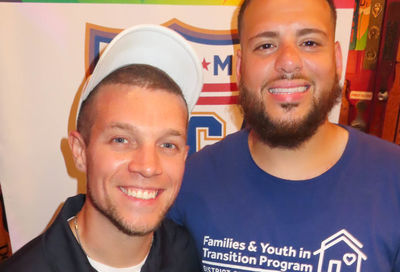Indiana AG says same-sex parents shouldn’t be listed on children’s birth certificates
Curtis Hill is seeking to challenge Supreme Court precedent under a more conservative set of justices
By John Riley on December 2, 2020 @JRileyMW

Indiana Attorney General Curtis Hill has asked the U.S. Supreme Court to reverse a federal appeals court’s ruling allowing a lesbian couple to be listed as the parents on their son’s birth certificate.
The couple at the center of the case, Ashlee and Ruby Henderson, are a married couple from Lafayette who were blocked by county officials from being listed on the birth certificate of their son, who was conceived through artificial insemination and carried to term by Ruby.
In 2015, the Hendersons sued, challenging Indiana’s birth records law that does not permit the non-biological parent to be listed on the birth certificate.
In their lawsuit, the Hendersons argued that leaving one mother’s name off the birth certificate would present legal issues when it came to health insurance coverage, who could speak for a child at a doctor’s appointment, and enrolling in school or in intramural sports.
They also argued it was unfair to force one parent in a same-sex marriage to spend anywhere from $4,000 to $5,000 to legally adopt the child they are raising with their partner, reports NBC News.
The courts sided with the Hendersons in 2016, finding Indiana’s policy unconstitutional. The state appealed the ruling to the 7th U.S. Circuit Court of Appeals in Chicago, and seven additional same-sex couples joined the Hendersons as plaintiffs challenging the policy.
In January 2020, the 7th Circuit ruled that under Indiana law, “a husband is presumed to be a child’s biological father, so that both spouses are listed as parents on the birth certificate and the child is deemed to be born in wedlock.”
As such, the justices maintained, a same-sex couple should be treated equally, with both spouses listed as parents regardless of biological ties to the child in question, in order to prevent discrimination.
Such laws, known as “presumption of parentage” laws, recognize the legal bond between a child and the non-biological parent who is married to the child’s biological parent, and are based on what is considered best for the care and protection of the child.
For example, such laws would recognize the male spouse of a woman who becomes pregnant by another man as the child’s father, rather than the biological father, based on the idea that the couple’s legal marriage — and the rights that derive from it — would provide a stable foundation for raising the child in question.
In 2017, the U.S. Supreme Court found similarly in a case out of Arkansas, known as Pavan v. Smith, in which two lesbian couples sued over a state policy prohibiting the non-biological mother from being listed as a parent on the child’s birth certificate.
The court found that because Arkansas has a “presumption of parentage” statute, a child’s birth certificate is not merely a vital record, but grants married parents a form of legal recognition not available to parents of children born out of wedlock.
See also: Court strikes down Idaho law barring transgender people from changing their birth certificates
But Hill, in his capacity as Indiana’s attorney general, filed a motion in June asking the Supreme Court to review the 7th Circuit’s decision.
He has since followed that up with his latest petition calling for a reversal of the decision. In his most recent petition, Hill claims that the decision violates “common sense” and could threaten parental rights that are based on a parent’s biological connection to their child.
“A birth mother’s wife will never be the biological father of the child, meaning that, whenever a birth-mother’s wife gains presumptive ‘parentage’ status, a biological father’s rights and obligations to the child have necessarily been undermined without proper adjudication,” Hill wrote.
The case is the first to deal with issues tangentially related to same-sex marriage ever since the confirmation of Justice Amy Coney Barrett.
Additionally, conservative justice Brett Kavanaugh had not yet been nominated when the case was decided, with Justices Gorsuch, Alito, and Thomas arguing against listing both parents on birth certificates.
Some LGBTQ advocates have previously expressed fears that social conservatives, like Hill, will seize the opportunity to erode marital rights and privileges enjoyed by same-sex couples by challenging precedent in the Pavan case and other pro-LGBTQ rulings.
Karen Celestino-Horseman, the Herndersons’ attorney, said she expects Hill’s brief to be discussed by the Supreme Court during a Dec. 11 conference.
“We are hopeful the court will follow the precedent in Pavan,” Celestino-Horseman told NBC News.
Read more:
Anti-LGBTQ school board member ends career on bum note
Laverne Cox targeted in anti-trans attack in Los Angeles
Lesbians much more likely to divorce than gay men, according to data
85-Year-Old Army Vet Comes Out as Gay in Obituary
Col. Edward Thomas Ryan, who spent his entire life in the closet, came out in a self-authored obituary as one of his final acts of courage.
By John Riley on June 16, 2024 @JRileyMW
Col. Edward Thomas Ryan died on June 1, the first day of Pride Month, at the age of 85 from complications related to intestinal cancer.
The decorated Army veteran's obituary, which ran in the June 8 edition of the Albany Times-Union, included a message he wrote ahead of his death.
"I must tell you one more thing," the message begins. "I was Gay all my life: thru grade school, thru High School, thru College, thru Life."
The message then reveals Ryan "was in a loving and caring relationship with Paul Cavagnaro of North Greenbush. He was the love of my life. We had 25 great years together. Paul died in 1994 from a medical procedure gone wrong. I'll be buried next to Paul.
Russia Horrified by Rainbow Unicorn Bank Card
Russian lawmakers have demanded the removal of a dancing rainbow unicorn from a bank card, calling the image LGBTQ "propaganda."
By John Riley on July 20, 2024 @JRileyMW
In what has become an all-too-common story, Russian lawmakers went ballistic over a bank card featuring a rainbow unicorn, decrying it as a form of pro-LGBTQ "propaganda."
Lawmakers from the Russian State Duma's Family, Women and Children Committee have called on Sberbank, Russia's largest financial institution, to remove the unicorn design from its specialty bank cards for children, declaring that anything involving rainbow colors is a symbol of the "international LGBT movement."
In a letter to Sberbank head German Gref, the lawmakers said that several "outraged" parents had complained to them about the bank card's design, seeing the cartoon unicorn as an attempt to indoctrinate their children.
Thailand Makes History by Legalizing Same-Sex Marriage
Thailand passed a bill that moves the country a step closer to becoming the first Southeast Asian nation to legalize marriage equality.
By John Riley on June 18, 2024 @JRileyMW
Thailand's Senate voted to approve a bill legalizing same-sex marriage, putting the country on the cusp of becoming the first in Southeast Asia to enact such a law.
The bill changes references in current law from gender-specific terms like “man,” “woman,” husband,” and “wife” to gender-neutral terms.
It recognizes the inheritance rights of one partner following the other partner’s death, regardless of gender, and grants same-sex couples the right to adopt.
The bill was previously approved in March by a vote of 400-10 in the country's lower house of parliament. On Tuesday, June 18, the Senate passed it 130-4, with 18 members abstaining.
Support Metro Weekly’s Journalism
These are challenging times for news organizations. And yet it’s crucial we stay active and provide vital resources and information to both our local readers and the world. So won’t you please take a moment and consider supporting Metro Weekly with a membership? For as little as $5 a month, you can help ensure Metro Weekly magazine and MetroWeekly.com remain free, viable resources as we provide the best, most diverse, culturally-resonant LGBTQ coverage in both the D.C. region and around the world. Memberships come with exclusive perks and discounts, your own personal digital delivery of each week’s magazine (and an archive), access to our Member's Lounge when it launches this fall, and exclusive members-only items like Metro Weekly Membership Mugs and Tote Bags! Check out all our membership levels here and please join us today!
The Magazine
-
Most Popular
 Matt Walsh Blasts Amber Rose's Appearance at the RNC
Matt Walsh Blasts Amber Rose's Appearance at the RNC  Kamala Harris to Appear on "RuPaul's Drag Race All Stars" Finale
Kamala Harris to Appear on "RuPaul's Drag Race All Stars" Finale  Poll: Who Should Kamala Harris Pick as Vice President?
Poll: Who Should Kamala Harris Pick as Vice President?  J.D. Vance Blocked 30 Pro-LGBTQ Ambassadors
J.D. Vance Blocked 30 Pro-LGBTQ Ambassadors  Buttigieg Smacks Down Vance for "Childless Left" Comment
Buttigieg Smacks Down Vance for "Childless Left" Comment  Pete Buttigieg's Blistering Takedown of J.D. Vance
Pete Buttigieg's Blistering Takedown of J.D. Vance  Gay Porn Star Austin Wolf Arrested on Child Pornography Charges
Gay Porn Star Austin Wolf Arrested on Child Pornography Charges  Gay Porn Star Forced by Russian Police to Entrap Gay Men
Gay Porn Star Forced by Russian Police to Entrap Gay Men  Losing Its Mind Over Kamala Harris, MAGA Stoops to Ugly Name-Calling
Losing Its Mind Over Kamala Harris, MAGA Stoops to Ugly Name-Calling  Elon Musk Says "Woke Mind Virus" "Killed" His Trans Child
Elon Musk Says "Woke Mind Virus" "Killed" His Trans Child
 Poll: Who Should Kamala Harris Pick as Vice President?
Poll: Who Should Kamala Harris Pick as Vice President?  Kamala Harris to Appear on "RuPaul's Drag Race All Stars" Finale
Kamala Harris to Appear on "RuPaul's Drag Race All Stars" Finale  This Week's Advertisers: Issue of July 25, 2024
This Week's Advertisers: Issue of July 25, 2024  J.D. Vance Blocked 30 Pro-LGBTQ Ambassadors
J.D. Vance Blocked 30 Pro-LGBTQ Ambassadors  Buttigieg Smacks Down Vance for "Childless Left" Comment
Buttigieg Smacks Down Vance for "Childless Left" Comment  Elon Musk Says "Woke Mind Virus" "Killed" His Trans Child
Elon Musk Says "Woke Mind Virus" "Killed" His Trans Child  San Francisco's Legendary Gay Club Oasis Robbed at Gunpoint
San Francisco's Legendary Gay Club Oasis Robbed at Gunpoint  D.C. High School Ordered to Recognize Anti-Gay Group
D.C. High School Ordered to Recognize Anti-Gay Group  Vineyard Voyages: Driving Through Virginia's Wine Country
Vineyard Voyages: Driving Through Virginia's Wine Country  Losing Its Mind Over Kamala Harris, MAGA Stoops to Ugly Name-Calling
Losing Its Mind Over Kamala Harris, MAGA Stoops to Ugly Name-Calling
Scene
Metro Weekly
Washington's LGBTQ Magazine
P.O. Box 11559
Washington, DC 20008 (202) 638-6830
About Us pageFollow Us:
· Facebook
· Twitter
· Flipboard
· YouTube
· Instagram
· RSS News | RSS SceneArchives
Copyright ©2024 Jansi LLC.












You must be logged in to post a comment.